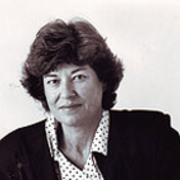
Marcia Russell
Marcia Russell began working in journalism at a time when women were more likely to be employed to type letters and make the tea. Her trailblazing career in print journalism and television has encompassed a major transformation in the number of women who work in both fields.
At high school in Auckland, Marcia Russell enjoyed writing. "I thought that's what I want to do," she later said, "make a living by writing and going around interviewing people, and talking to them about their lives". But she got the impression that the visiting guidance counsellor was keener to promote jobs which would serve as a stop-gap measure before marriage.
The former head prefect began as a cadet reporter at the NZ Herald in 1959. Russell was the first woman to work on the general news pages of the morning paper, although at that point laws made it problematic for women to work past 11pm.
In 1961 she set off for England, where she did a stint in public relations, helped edit a TV magazine and dabbled in scriptwriting.
Back in New Zealand, Russell worked behind the scenes as a writer and editor on a range of magazines and newspapers. In 1968 she became founding editor of Thursday magazine. The magazine was designed as a more in-depth alternative to the many women's magazines of the time that were filled with "wall to wall knit your own royal family".
She found stories worthy of coverage in every direction, including abortion law reform, and a campaign to bring in the domestic purposes benefit. In 1973 Russell spoke at the first United Women's Convention in Auckland, to an audience of more than a thousand. She talked about this period in pioneering 1976 doco series Women. 2004 follow-on documentary Sheilas - 28 Years On includes interviews with Russell reflecting on this period, as well as material on Russell from the original series.
In 1975, the year New Zealand television was reborn as two competitive channels, Russell was invited to join new channel South Pacific Television. Her first job in the new medium was as co-presenter of Speakeasy, a daily talk show now best remembered for marking the debut of celebrity chefs Hudson and Halls.
Over the next few years Russell completed training courses in producing and directing, and worked as a current affairs reporter on Perspective and a producer on the nightly News at Ten, which won SPT one of its first Feltex Awards, before being cancelled the following year.
In 1978 Russell directed Six Artists, a series devoted to New Zealand painters, and Mercury 10, a dramatised documentary on Auckland's Mercury Theatre. She was also script editor on award-winning documentary series Landmarks, which used history and geography to explore New Zealand's development.
In the first half of the 80s Russell concentrated on other mediums. She wrote for the Listener, did some television criticism and occasional radio talkback, and worked on the marketing of Kiwi movies Trespasses and Other Halves.
Russell then became a key player in the creation of a third television channel. As managing director of Tele-vid News, the company which successfully bid for the first private TV broadcasting warrant, she designed the basics of the network's proposed news and current affairs service. When the successful winners of the warrant were restructured as a single company shortly before launch date in 1989, she became TV3's Executive Director of News and Current Affairs. She appears briefly in the closing minutes of the channel's very first prime time bulletin, on 27 November 1989.
From 1990 Russell concentrated on documentary work, either as writer, producer, or both. Many were made under the Images Ink umbrella — a company formed by Russell and partner Tom Finlayson, and named after their respective strengths in images and writing. Through Images Ink, Russell wrote and narrated a documentary on New Zealand's presence at Expo '92 in Seville, and another on Dame Cath Tizard as she became the country's Governor-General (Dame Cath Moves Up).
She also produced a series of one minute television spots to mark suffrage year in 1993, and produced 1994's The Traders, a series on New Zealand exporters.
The most ambitious project was four-part documentary series Revolution, which examined changes in New Zealand society in the 80s (the series can be watched in full at NZ On Screen). Revolution included interviews with many players in the introduction of Rogernomics, including Roger Douglas and Richard Prebble. Russell wrote and produced; she also authored companion book Revolution - New Zealand from Fortress to Free Market. In 1997 the series won a Film and TV award for Best Factual Series.
Russell also worked as script editor on Jamie Belich's award-winning 1999 series The New Zealand Wars.
A founding chairperson of the organisation MediaWomen, and a one-time presenter of media show Fourth Estate, Marcia Russell was awarded an OBE for services to journalism in 1996. In 2003 she became a recipient of the inaugural Lifetime Achievement Award at that year's television awards.
Russell went on to complete a Master of Arts with first class honours. She was working on a thesis on New Zealand-born poet and journalist Elizabeth Riddell when she discovered she had cancer. Auckland University awarded her with a Master of Literature during a special ceremony at Auckland's Mercy Hospice, although Russell made it clear that the day was about illuminating the lives of others, not her own achievements. She died four days later, on 1 December 2012.
Profile updated on 1 November 2021
Sources include
Marcia Russell
'Top People in New Channel', The Dominion Sunday Times, 30 August 1987, Page 9